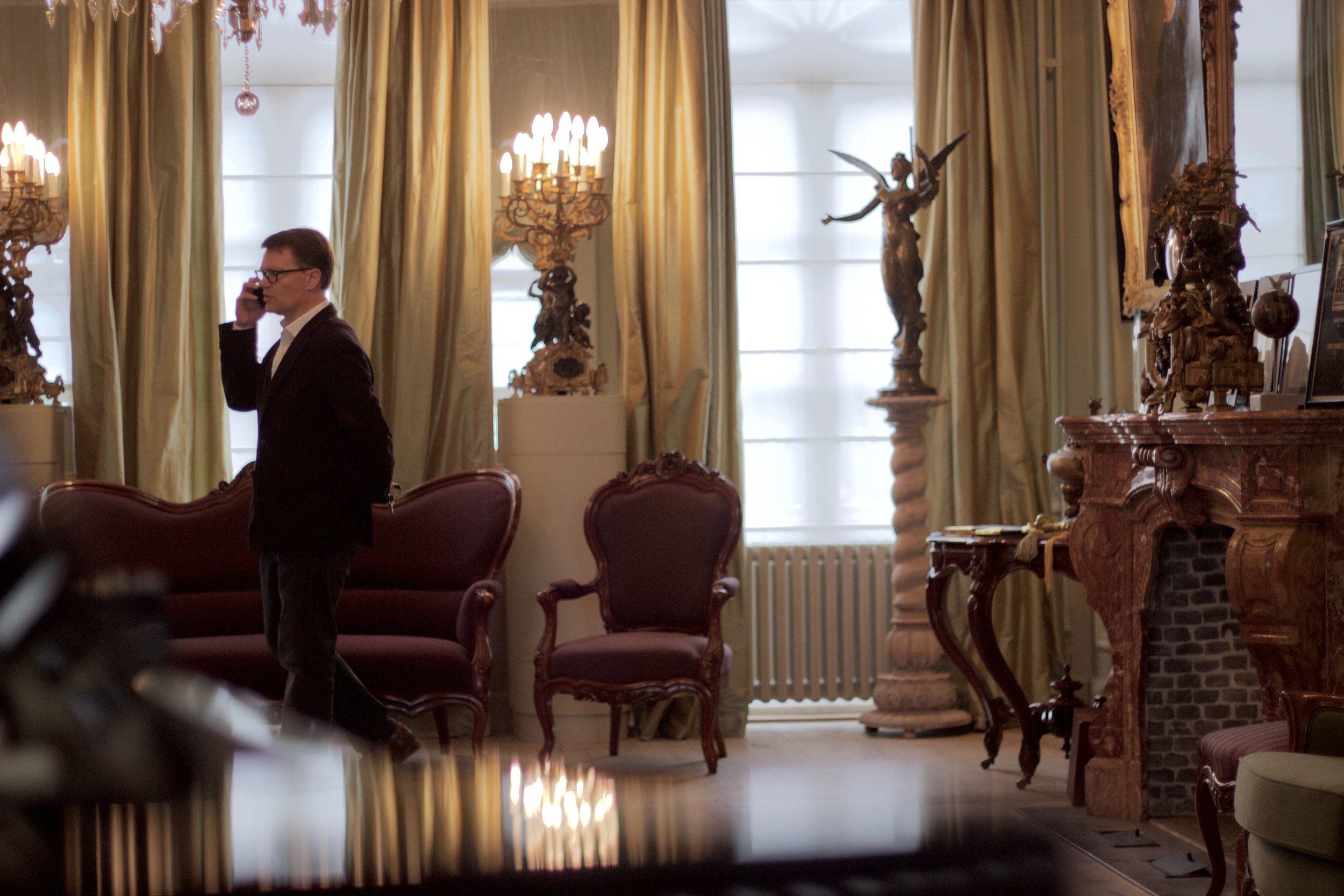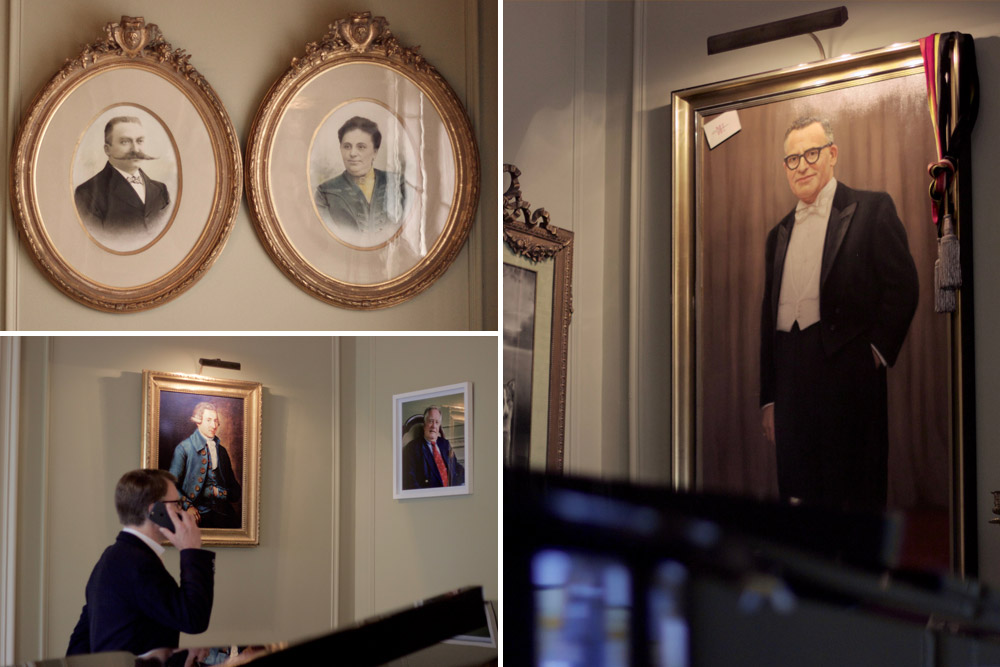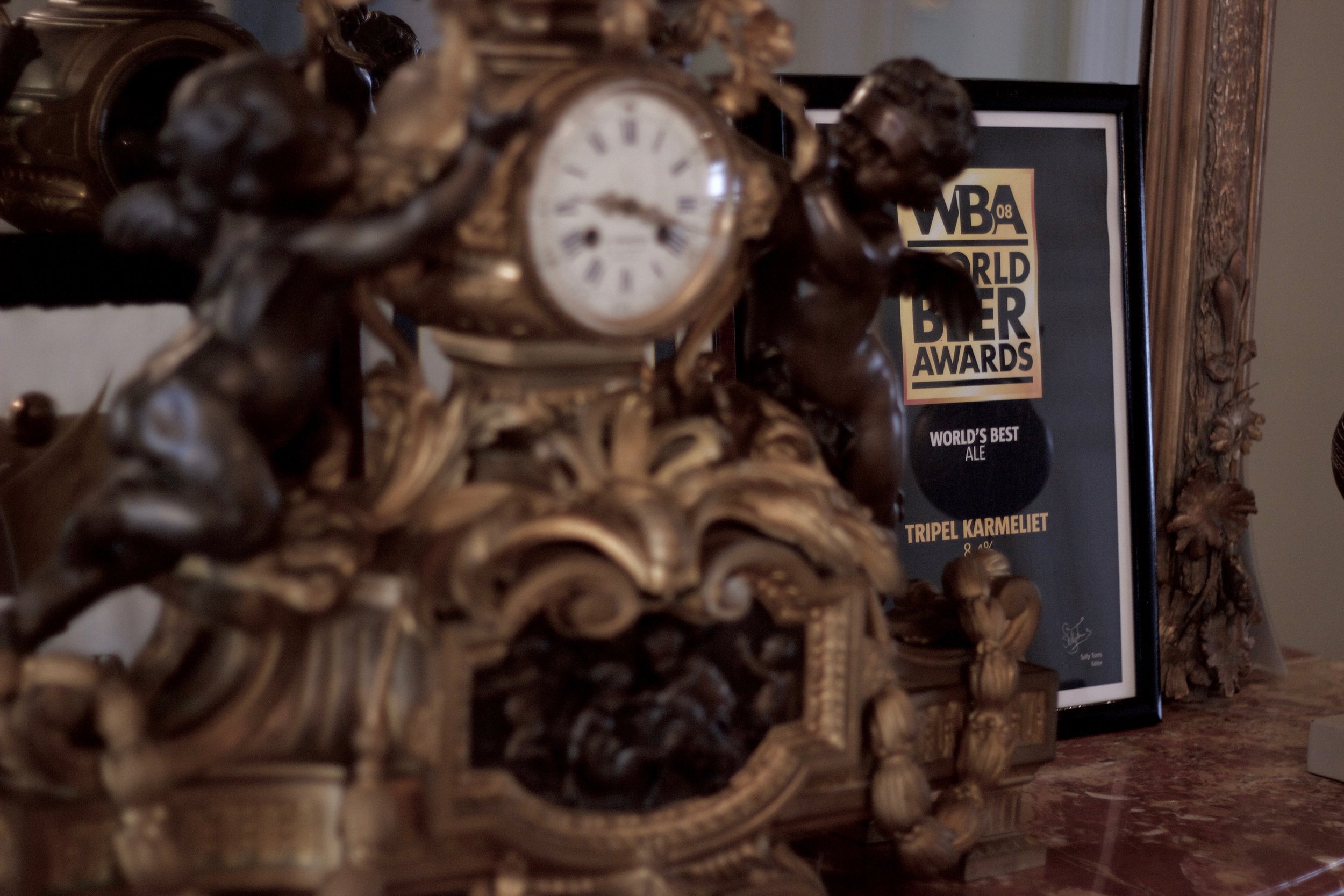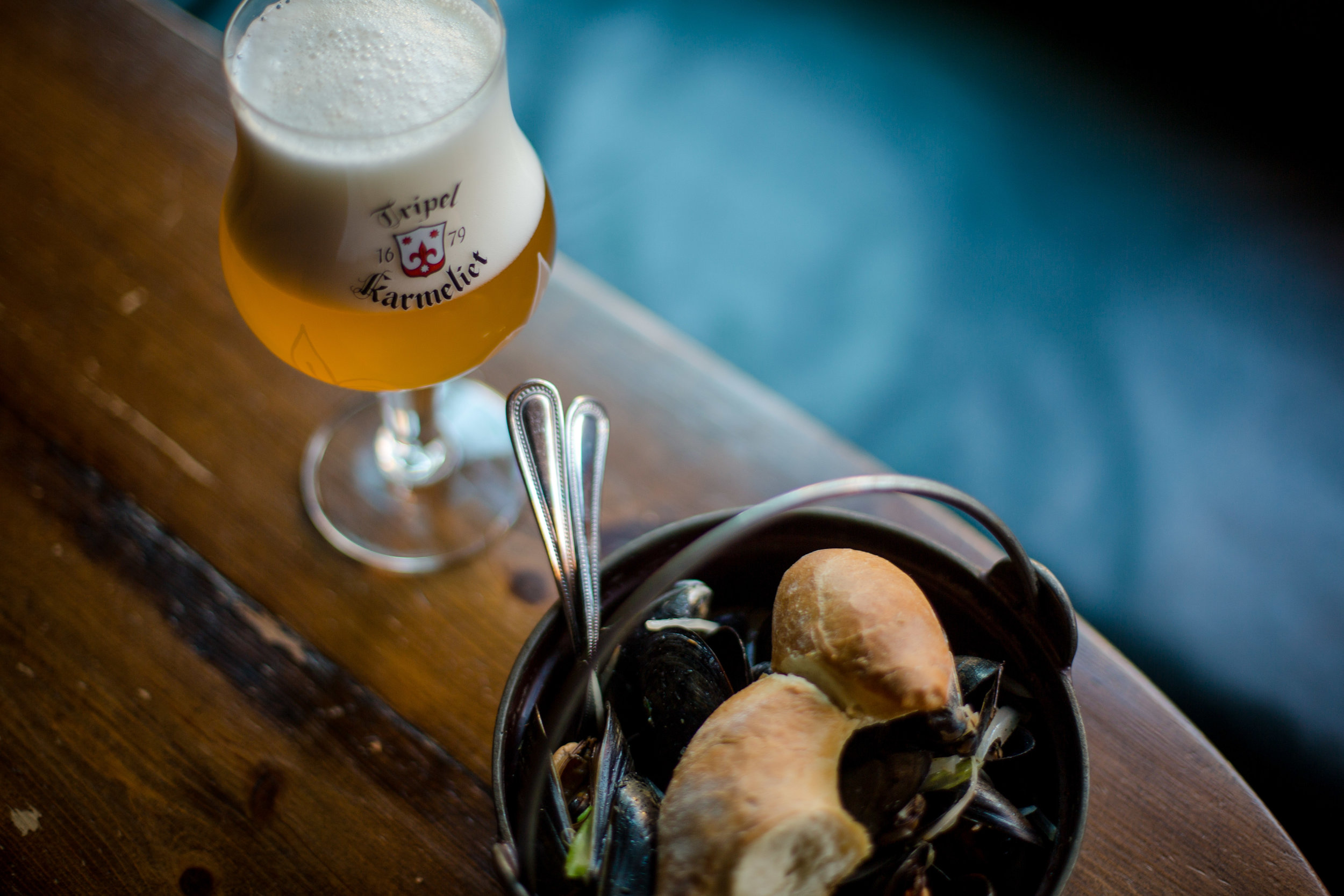On February 15, 2013, an American beer bar and eatery with an obsessive devotion to Belgian beers celebrated 21 years of being in business. To mark the milestone, the Hopleaf Bar—located in Chicago’s Andersonville neighborhood—launched a promotion: for an entire year, customers with a son or daughter turning 21 years old could bring that child in on their birthday and receive a $100 tab for dinner and drinks.
“If I was at the bar, I tried to join every one of those families for a beer,” says Hopleaf owner, Michael Roper. “That gave me an opportunity to watch what they ordered.”
One of the most popular beers ordered by the families was Tripel Karmeliet, an 8.4% ABV Golden Tripel from Brouwerij Bosteels in Belgium. Roper recalls parents taking selfies of their kid’s first Belgian Tripel.
“What that showed me is that there is a strong bond between these people with the Hopleaf and with Tripel Karmeliet,” Roper says. “It’s a thrilling beer in a beautiful package.”
Since Tripel Karmeliet was imported to the U.S. for the first time in 1997, it’s been a constant on the Hopleaf menu. This year marks the 20th anniversary of Tripel Karmeliet’s first import into the States, a milestone which vindicates the strategy and principles upheld by both the owners of one of Belgium’s oldest continuously-brewing family operations and the import, distribution, and retail partners with whom they’ve worked.
In a move which surprised many, Brouwerij Bosteels was purchased last year by ZX Ventures—a subsidiary of Anheuser-Busch InBev—in a deal reported in the Belgian press to be worth $225 million.
[Disclosure: Good Beer Hunting's studio side is the Executive Producer of a Condé Nast project, October, in which ZX Ventures is an investor.]
How this change of ownership is managed at a time when themes of independence and authenticity underpin a large part of brewing industry discussions could define whether or not the American consumer maintains a strong connection with the brand. Does Triple Karmeliet personify the sophistication and quality-driven mindset of its founding family, or is it just another sell-out?
In one of the many rooms of the old Bosteels family house in the Flemish village of Buggenhout, an unassuming wooden Coat of Arms, bearing symbols of basic brewing and farming tools, hangs over a large section of the wall. A simple motto across the bottom of the Coat of Arms reads: “Handhaaf en Bouw.” “Handhaven” is a Flemish verb that means “to maintain.” “Bouwen” means “to build.”
“That’s an old family motto from my grandfather,” says Antoine Bosteels, seventh generation owner of the brewery. His grandfather, also called Antoine Bosteels, once served as mayor of Buggenhout. “I’ve changed the family motto a little since then to reflect who we are now.”
Bosteels takes a phone call, pacing around the restored wooden floorboards of the large family drawing room. In his thick, black-rimmed glasses, crisp white shirt, and burgundy plain-toe derby shoes, he takes slow, regular steps from the black grand piano on the courtyard side of the building to the main space underneath the crystal chandelier. The call is a discussion with a potential new staff member, someone who hopes to join the sales team. On the walls hang portraits of the six generations of his family who have spearheaded the direction of the family brewery before him.
The Bosteels family has brewed continuously here since 1791, 39 years before the formation of the Kingdom of Belgium. When the brewery started, the geographical territory it occupied would have belonged to the United Kingdom of the Netherlands. The family lived in this 19th century property on the grounds of the current brewery for more than a hundred years. Antoine’s father and predecessor, Ivo Bosteels, was born in the house. Antoine’s grandmother, Adrienne Van Eecke, moved out in 1994—into another house on the brewery grounds. The listed building has slowly been transformed into offices as the brewery has expanded.
In the corner of the drawing room, framed a little smaller than the larger paintings, is a photograph of Ivo, who is still involved in the business today. There are similarities between father and son: short frame, bushy greying eyebrows, and a penchant for formal jackets. Ivo’s uncle was a war hero and the subject of a statue representing fallen Belgian soldiers, a copy of which can be seen in the small café on the grounds of the brewery. There’s another copy of the statue in the official World War I museum in Ieper. The original statue is located 100 kilometers (about 60 miles) away, in the West Flemish village of Merkem.
“I don’t have brothers or sisters,” Bosteels says. “It was easier for the handing over of the brewery from my father to myself. It’s one generation you don’t have to worry about. Otherwise, every generation, you have to deal with that. And it can suck away a lot of energy. We don’t even know when officially I became CEO. We’ve never had any conflict of generations because, I think, if you use your logic, you often come out with the same conclusions.”
Antoine has two daughters, aged 18 and 20, who would have been in line to take over the running of the brewery as the eighth generation before the buy-out. “They know they don’t have a sure working place anymore,” Bosteels says. “Probably for them, that’s a little concern, but it’s not something you can take into account.”
“We expanded the scope of the Tripel and you see that some now try to imitate. I guess imitation is flattery.”
Brouwerij Bosteels produce a Belgian Amber Ale (8.4% ABV) named after local historical innkeeper Pauwel Kwak, served in a distinctive convex baubled yard glass with wooden stirrup. They also make DeuS Brut des Flandres (11.5% ABV), which is brewed in Buggenhout, but matured for nine months in the Champagne region of France where it undergoes the traditional techniques of remuage and dégorgement before being packaged in a curvaceous ‘Cuvée des Sacres’ heritage bottle and served in its own elegant flute.
On the mantelpiece of the drawing room sits a framed certificate from the World Beer Awards, declaring their third beer—Tripel Karmeliet—to have been the “World’s Best Ale” in 2008.
“Tripel is perhaps the most highly regarded style in Belgium,” Bosteels says. “Every brewery in Belgium wants to parade their Tripel just as every brewery in the United States wants to parade their IPA. This is our battle cry.”
Tripel Karmeliet—launched in 1996—is produced using malted barley, wheat (both malted and unmalted), and oats (both malted and flaked). The wheat and the oats together make up more than 50% of the grain bill. Bosteels describes the beer as a “three-grain Tripel,” an idea he says was inspired by a multi-grain bread in a local bakery.
During the several years he worked on the beer, choosing the three grains in carefully selected proportions, he says he came across Herinneringen aan Dendermondse Brouwerijen (Memories of Dendermonde Breweries), a journal published in 1990 by a member of the local historical society, Oudheidkundige Kring van het Land van Dendermonde. The publication examined breweries in the area that had disappeared, and included a multi-grain beer recipe dating back to 1679 from a brewery at the Carmelite Convent in nearby Dendermonde.
“History would tell us it’s naïve to think [Bosteels] won’t change. But that’s coupled with the hope that it won’t change based on what’s being communicated at this point.”
“They used the same grains in almost exactly the same proportions that we were using,” Bosteels says. “It might have been coincidence, but they probably did their testing and came out with the same choices as we did. At that time, we had no name for the beer so we thought it logical to name the beer Tripel Karmeliet.”
Tripel Karmeliet—along with another Tripel from the brewery at the Trappist Abbey of Westmalle—are often held up as the two variants of the Belgian Tripel and regarded as the standard bearers for the style.
“They’re quite different,” Bosteels clarifies. “We are 8.4% ABV and they are at 9.5% ABV, so they have a bit more alcohol, but I think, body-wise, it’s very close. They work more on the bitterness. And we are more floral. Our aromas are a bit stronger. In the finish, they are a bit more aggressive perhaps, we are more soft. We expanded the scope of the Tripel and you see that some now try to imitate. I guess imitation is flattery.”
In the short corridor leading inside from the main entrance to the old family house hangs the revised Bosteels Coat of Arms. It was registered at the official Heraldry database by Antoine Bosteels on behalf of his family and published in official government notifications for the first time on August 7, 2012.
This revised version depicts two seated griffins on an escutcheon, a gold-plated helmet from which tarpaulins of silver and royal blue billow outwards, offering frame. In glazed letters on a silver ribbon underneath is the new family motto, written not in the family’s Flemish mother tongue, but in the historically weighted language, universal and esteemed, of Latin: “Moli et Meliora.”
“Moli” has its etymology in the Latin verb “molō,” meaning “to grind or mill.” “Meliora” translates as “better.”
“It’s almost the same meaning as the original, but not quite,” Bosteels says. “It means to exert yourself. It means to improve and get better.”
Lanny Hoff stands beside a fax machine in his Minneapolis house. It’s 2001, and the 32-year-old has just stopped working at an American import business, All Saint’s Brands, Inc. He’s about to embark on his own import business with friend and colleague, Bob Leggett. Their plan is to bring boutique and specialty beers—high quality, world-class, and unique—from England, Germany, and Belgium, into the United States. It’s the first day of their new enterprise, which they are calling Artisanal Imports Inc.
The fax machine in Hoff’s house is sending messages to all the breweries he’s worked with in his previous job to let them know of his new one. One of the faxes goes to Buggenhout in Belgium. “Within five minutes, Antoine Bosteels was on the phone with me,” Hoff remembers. “He was very clear. ‘Of course,’ he said. ‘We’ll go with you.’”
“We are an historical brewery, now in a specialty family. That family is part of AB InBev. They are like a cousin of ours. There is nobody from AB InBev here working in the brewery.”
Bosteels’ first foray into export in the States was with a company called Flanders Specialty Ales in the early 1990s. Although there was some interest in their Amber Ale, Kwak, it didn’t catch on Stateside, and they quickly switched to another importer, All Saint’s, where a young, enthusiastic sales and marketing representative called Lanny Hoff started working their products.
“Lanny was our guy,” Bosteels remembers. “I followed him because I thought he was more important to follow as a person.”
Hoff identified the charismatic nature of father and son—Ivo and Antoine Bosteels—as something Americans would engage with in a brand. “Everything lined up,” Hoff says. “We liked the beer. We liked the people making it. We liked the brewery. It became clear after a very short period of time that they weren’t standing still. Tripel Karmeliet is now one of our lead brands.”
The relationship between Bosteels and Artisanal Imports is a close, long-standing, almost familial one, a connection grounded in nostalgic sentiment based on memories of the early days when they worked to help each other thrive. Indeed, without Bosteels, Artisanal Imports would not have become established as an import player so quickly.
“They gave us the brand nationally,” Hoff says. “That was huge for us.”
The main contact person between Artisanal Imports and the brewery is Bosteels’ Export Manager, Jack Van Antwerpen. Hoff believes that Van Antwerpen has been instrumental in the success Tripel Karmeliet has enjoyed in the U.S.
“He’s the traveling face of the brewery here and the guy we do all of our planning with,” Hoff says of Van Antwerpen. “He brought a level of organization to the brewery that we had not seen, a commercial and marketing mind that allowed Bosteels to achieve its potential.”
Van Antwerpen—tall, silver-haired, and affable—jokes that he has come “full circle,” having started his career in the beer industry 37 years ago at the age of 22 with an independent Brouwerij Artois in Leuven. He now works for companies that produce large quantities of Stella Artois for a global market. During his time selling Leffe and Vieux-Temps in the Netherlands, then at Timmermans Lambic brewery before it was part of the Anthony Martin group, and finally as commercial manager at Brasserie Du Bocq in Purnode, Van Antwerpen developed a strong relationship with Ivo Bosteels. He moved to Brouwerij Bosteels in 2007 and provided an injection of energy and know-how which had an immediate impact on export to the States.
“It was the best move in my career,” he says. “When I started at Bosteels, we were doing some containers of Tripel Karmeliet, maybe five or six in a year. Now we do that in a week. But numbers are not our philosophy.”
When Wes Phillips came to Chicago from Champaign, Illinois in 1995, he moved—with particular intent—into an apartment that was situated a block away from the Hopleaf. And during the seven years he worked in Chicago for a marketing company as Director of Client Services, he was a regular in the bar. He started working as a bartender in the Hopleaf in May 2003, just after the launch of the anniversary promotion with the free tabs for the newly minted 21-year-olds.
“I got introduced to Tripel Karmeliet as a patron and an employee of the Hopleaf,” Phillips says. “When it came along, it was a new entry into that cannon of Belgian tradition, and it came with an authentic story. It was a new beer from the old world.”
In 2005, Phillips started working for Windy City Distributing Company, an independent specialty beer distributor that now represents more than 70 suppliers throughout the eight-county Chicagoland area. Windy City would go on to become the biggest distributor of Tripel Karmeliet in the U.S. Between 2005 and 2010, Artisanal Imports and Windy City Distributing together tripled the Bosteels business in the region.
Wesley points to the period between 2003 and 2007 as an important one in Tripel Karmeliet’s advance, as boutique imports piggy-backed on demand from retailers and consumers for the more interesting flavor profiles offered by the burgeoning American craft scene.
With more than 6,000 breweries in the United States of America, growth of imports has stagnated, but it hasn’t gone away. Phillips points to millennial drinkers, especially those living in urban areas, who gravitate towards strong narratives and unique experiences.
“That’s just the way the younger generation are making their purchasing decisions,” he says. “People are looking for a story behind the things that they consume, whether it’s clothes, food, or otherwise. As long as these products remain authentic and true to themselves, there is no fear of them going away in their entirety. That’s going to be the challenge for Bosteels with the AB InBev relationship.”
In their quarterly report of October 2017, Artisanal Imports state that their import category is healthy and, rather than relying on seasonal spikes, Belgian beer is selling well throughout the year, with a more stable grasp of the marketplace. There’s also a continuing maturity, they report, in how the Belgians are selling in the U.S., including an awareness on their part that they need to communicate the sophistication of their products, build a presence on the ground, ensure that their authenticity resonates, and overcome cultural unfamiliarity, sometimes by updating—or even “American-ising”—their packaging.
“The bar was selling Tripel Karmeliet on draught in plastic cups. Antoine got very upset. He immediately shut the bar down and never sold them his beer again.”
As Export Manager, Van Antwerpen accepts that a more competitive market will always present challenges, but believes anything is possible provided you have the right conditions. “You have to have a high quality product,” he says. “And we have a very high quality product. And you have to have professional and focussed specialists who understand the niche market. That’s the case with Artisanal. They are the best importer in the U.S. for craft Belgian brewers.”
In 2010, Hoff attended the Brussels Beer Weekend, a festival in the center of Brussels, at which he was inducted into the Knighthood of the Brewers' Mash Staff, an honor handed out by the association of Belgian Brewers to those who have made an exceptional contribution to the promotion of Belgian beer both at home and abroad.
After the ceremony, Hoff went for a beer in Taverne Manneken Pis in Rue des Grands Carmes, just off the Grand Place. “The bar was selling Tripel Karmeliet on draught in plastic cups,” he recalls. “We reported back to Antoine. He got very upset. He immediately shut the bar down and basically never sold them his beer again.”
The Hopleaf carries more than 80 different types of glassware for its beer, but the Tripel Karmeliet glass is one of its most eye-catching, distinctive, and graceful. It’s a large tulip glass, thick-stemmed with solid foot, the bowl marked with a stylized fleur-de-lis graphic as well as the beer’s very own logo and the year of the “discovered” recipe from the Carmelite nuns in Dendermonde: 1679. It balances visual boldness with refined elegance, and does an excellent job of showing off the deep golden color of the beer as well as accentuating its generally billowing white head.
Phillips bartended at the Hopleaf for two years. “By the time I sold one Tripel Karmeliet on my shift, five or six more would go out,” he says.
“It’s the most brilliant marketing of all,” Roper says of the glassware. “It’s marketing that you spread throughout the bar or restaurant. The customers market it to other customers.”
It was only a few years ago that Bosteels provided Artisanal Imports with a brewery logo that they could use as a marketing tool. Tripel Karmeliet, Kwak, and Deus were never to appear on the same promotional materials. “I don’t think most of our customers know that Tripel Karmeliet and Kwak are from the same brewery,” Roper says.
Bosteels have always kept their brands apart, and carefully swept the name of their brewery into the background, a point of discrete frustration for an importer trying to tell the story of a family brewery. “We have on many occasions made a good case for the family branding of Bosteels beers,” Hoff says. “We’ve been very persuasive. It doesn’t really change their resolve to keep things the way they are.”
“The unique selling proposition of Tripel Karmeliet as a total beer brand and concept and the unique selling proposition of Kwak as a beer brand and concept are stronger than the unique selling proposition of Brouwerij Bosteels being an old brewery,” Bosteels explains.
Another hurdle for Artisanal Imports in selling Tripel Karmeliet in the U.S. has been that Bosteels are reluctant to rely too heavily on “Brand Belgium.”
“I’ve seen what happened with the French wines,” Bosteels says. “We now have Australian, South African, and American wines coming up. You have to be excellent. It’s not about nationality any more. Of course you have the inheritance and history of Belgium as a beer nation, but it’s about the identity of the beer and the personality of the brand.”
In the last 27 years, Bosteels have launched only three new beers (Kwak was relaunched in 1980, Tripel Karmeliet in 1996, and Deus in 2002). “Every single time we see them, we ask about a new beer,” Hoff laughs. “Every single time. The response is always the same. Nothing.”
“We have on many occasions made a good case for the family branding of Bosteels beers. It doesn’t change their resolve to keep things the way they are.”
In Belgium, Bosteels claim to have experienced double-digit growth year on year. Reports from their close commercial partners suggest that demand for their beers in neighbouring markets of France and the Netherlands have exploded in recent years. “In the not-too-distant past, we’ve been limited to the amount they could grow because they couldn’t make enough beer,” Hoff says. “Antoine doesn’t feel the need to introduce a new beer because they’re still realizing solid growth all over the place.”
On July 1, 2014, more than two years before the ZX Ventures buy-out, a Dutch company, Waterland Private Equity Investments B.V., took a stake in Brouwerij Bosteels. It was the first time in the brewery’s history that it was not wholly owned by the Bosteels family.
“Waterland came and visited us with the aim of consolidating some specialty breweries in Belgium,” Bosteels says. “There were a lot of new beers and breweries coming up. We wanted to create a platform. It wasn’t that Bosteels would be one of the possibilities. Bosteels itself would be the platform. Waterland took a minority share.”
It was agreed that Bosteels would continue operations while Waterland approached a number of breweries to join this new platform, a range of Belgian family breweries producing brands across a spectrum of beer styles, flavor attributes, and geographical locations which might look in the end something like the highly successful Duvel Moortgat portfolio (La Chouffe, De Koninck, Vedett, Liefmans, and the Duvel beers). But none of the Belgian breweries approached by Waterland were interested.
“It was not successful,” Bosteels remembers. “I said to myself that if this does not work, then we look at the other side.”
On the morning of November 15, 2017, the 30 staff members of the ZX Ventures Craft and Specialties team bustle around glass-walled, open plan spaces on the sixth floor of a Manhattan office building. Every one of them is required to complete Level One of the Cicerone® Certification Program. They’re expected to undertake the beer knowledge training offered internally on a regular basis. On the ground floor of the offices, ZX has installed an operating brewery, not so that it can sell products, but so that its employees—whether they’re from finance, sales, or legal—can realize their ideas and stage brewing battles.
Jerome Pellaud is in charge here, together with his colleague in the Sales department, Gabriel Mello. Pellaud, whose responsibilities include “brewing, logistics, marketing, and beer knowledge,” is running between meetings—some in the sofa-laden chill-out areas, others on telephone conference calls—preparing to catch a flight to Belgium that evening.
“My office is in New York,” he says. “But most of the time, I’m on an airplane.”
Since being established in 2015, ZX Ventures have acquired a stake in a beer retailer (Beer Hawk, UK), a homebrewing supplier (Northern Brewer, U.S.), an online beer rating website (RateBeer, U.S.), and a number of breweries (Birra del Borgo from Italy and Camden Town from the UK). They’ve developed what they describe as “brand experiences,” such as their rollout of Goose Island brewpubs internationally.
“We’re a subsidiary of AB InBev,” Pellaud says. “But we are working mostly independently.”
His trip to Belgium that evening will see Pellaud and some of the brewers and engineers in his team at ZX travel to Buggenhout to work with Brouwerij Bosteels on a series of measures to significantly increase the capacity of the brewery. The plan is to double it in the mid-to-long term. “We provide project management, engineers, and experience in training and staffing,” Pellaud says. “Our role is also to connect all of our partners, because they can all help each other. Among them, we have an expert in every single area of the brewing process.”
“Every single time we see them, we ask about a new beer. Every single time. The response is always the same. Nothing.”
It won’t be Pellaud’s first time in Belgium. Originally from Switzerland, where he completed a Master of Science in Chemistry at L’Université de Neuchâtel and then a phD in Biophysical Chemistry at the University of Basel, he went on to study brewing at Belgium’s largest French-speaking university, L’Université Catholique de Louvain in Louvain-la-Neuve, before working with AB InBev as a Brewing Science Specialist, and then in Global Exploratory Product & Packaging Development.
“My dream was always to move into brewing,” he says. “So the best place is Belgium, right?”
Pellaud’s studies at Louvain-la-Neuve—which took place almost 20 years ago—centered on physico-chemical analysis of the compounds which deliver tropical aromas and flavors from hops. “We set the foundation of the analysis of which compounds give the passion fruit notes when you use Simcoe or Nelson Sauvin,” he says. “Now everyone is looking for these molecules.”
“I don’t know how they can sell something that was developed over so many generations of a family. I’m more of a romantic. For me, it’s hard to understand.”
Lanny Hoff was in Belgium at the time the sale of Bosteels to ZX completed on September 8, 2016. “We heard this rumor and we were surprised,” Hoff remembers. “We asked Antoine if there was any truth to it. He told us there absolutely was not. He explained that there were some outside investment folks involved in the brewery looking for some avenues to realize something from their investment. If they knew something then and they weren’t telling us, then I would hate to have to play poker against Antoine Bosteels.”
ZX and Bosteels had indeed been talking, but only for a short time. Bosteels was featured on a shortlist of “ideal partners.”
“We’re always looking for the best possible beers,” Pellaud says. “Tripel and Strong Blonde were styles that were a little bit missing in our portfolio. We then always look at the founders. We want to make sure they are passionate people who want to keep growing their business the way they have done. Then, we can support their vision.”
ZX had reached out to Bosteels through a mutual contact and conducted a series of discussions. “Waterland had a significant equity in the company,” Pellaud says. “So they also wanted to see if maybe there would be an exit option for them as well. That’s when we started to speak. We had luck with the timing because of that.”
Waterland were delivering Bosteels to ZX in good shape. Over their three years involved with Bosteels, they had made investments that included the creation of a new logistics distribution center to reduce the traffic burden in the village centre of Buggenhout, an extension to the brewery hall, a new malt processing area, and the installation of a new waste water purification system. By the middle of 2016, production at Bosteels had increased from 110,000 hectolitres annually to 145,000 hectolitres. When contacted by GBH about the reasons for their exit, Frank Vlayen, Group Managing Partner at Waterland, declined to comment.
ZX wasn’t the only investor interested, either. Media reports at the time suggested that the Heineken and Duvel Mortgaat groups were both also involved in discussions.
“You never know if your choice will be the best fit,” Bosteels says. “But I felt very good with the ZX Ventures perspective. We have been taken over by a separate, special division. We are an historical brewery, now in a specialty family. That family is part of AB InBev. They are like a cousin of ours. There is nobody from AB InBev here working in the brewery. All our employees, including the new ones from last year, are on contracts with Brouwerij Bosteels NV. We see that after one year working with ZX Ventures that we keep our own strategy, that the quality is super important, that we are going to invest in 2018 as we have done before, but with an acceleration in that level of investment.”
“Every brewery in Belgium wants to parade their Tripel just as every brewery in the United States wants to parade their IPA. This is our battle cry.”
It’s now just more than a year since the sale of Bosteels to ZX. The brewery is no longer a part of the Belgian Family Brewers, a non-profit association of 20 independent family breweries which have been brewing beer in Belgium for at least 50 years non-stop, representing 15% of the total annual beer volume produced in Belgium. The association lost three members in 2016, including Brouwerij Palm (acquired by Bavaria), Brouwerij Van Honsebrouck, famous for their Kasteel brands (who left voluntarily after a disagreement on the vision for the association), and Brouwerij Bosteels.
“We have members leaving because of consolidation,” says Xavier Vanneste, owner of the Halve Maan brewery in Bruges and Chairperson of the association at the time of the Bosteel’s buy-out. “Their memberships will not be renewed.”
As an employee with a new boss, Van Antwerpen understands his future is not certain. “I hope to stay here,” he says. “I really believe in the future of Bosteels. It would be a big mistake if they changed anything.”
Phillips was “shocked and disappointed by the news” of the acquisition. “Because of the history and tradition of that brewery, I think a lot of people would have preferred that it remained intact as an independent entity,” he says. “History would tell us it’s naïve to think it won’t change. But that’s coupled with the hope that it won’t change based on what’s being communicated at this point.”
Windy City will continue to work with Artisanal Imports on the distribution of Tripel Karmeliet and the Bosteels brands. “As long as the beer continues to be the quality that it is, and as long as the brewery continues to be represented in the way that it is, it fits into the niche of not only our portfolio, but the portfolio of the retailers that are carrying and selling the brand,” Phillips says. “Quite frankly, as long as AB InBev, for lack of a better turn of phrase, leaves them alone in the U.S., I think Bosteels can continue to find success. But it won’t take much change for them to blow it. The retailer and the consumer is way too smart these days.”
Bosteels argues that you can’t predict the future.
“Myself, as CEO, I could have changed,” he says. “I could have made other choices. It’s not because you are a family that you made the right choices. It’s not because you are a family brewery that you have respect for quality.”
“Here are the things I know today,” Hoff says when considering whether things are likely to change. “I know the same people are making the beer today as when AB InBev took over. I know they’re making it in the same place. I know they’re investing in the same place to make it bigger so they can make more beer. I think there’s a chance that this is going to be a new experience for AB InBev in Belgium.”
Ivo Bosteels and his wife, Marie-Henriette Muylle—Antoine’s parents—visited the Hopleaf for the first time in the mid-2000s, several years after Tripel Karmeliet had been imported into the States for the first time. They came unannounced, but Michael Roper happened to be at the bar, and sat with them for dinner.
One of the specialties on the menu at the Hopleaf is Moules-Frites, mussels steamed in Belgian wheat beer and prepared with sliced shallots, celery, thyme, and bay leaves. Ivo saw it on the menu and ordered a large bucket.
“I don’t think that the sale of the brewery is something that Ivo would ever have done,” Roper says, recalling the visit. “I’m sure that they’ve had offers over the years. I can tell that Ivo wouldn’t have considered any of them at all. Ivo was much more interested in the romance of a seventh-generation family owned brewery whereas I think that Antoine is more pragmatic and business-like. I think he sees it as a way to grow the brand. Perhaps it’s also because the amount of money being offered is so great that it ensures the financial stability of your family for generations to come.”
“I don’t know how they can sell something that was developed over so many generations of a family,” Roper adds. “I think I’m more of a romantic. For me, it’s hard to understand.”
Ivo told Roper that the large bucket of mussels he was eating were the best he’d ever tasted, a compliment Roper recalls with great pride. Ivo then asked Marie-Henriette what she was doing differently when she prepared mussels for him in Belgium. Roper listed out the ingredients in front of them. When Roper mentioned butter, Marie-Henriette looked up.
“It turns out that she was trying to take care of him, so she didn’t put butter in the broth,” Roper says. “But butter is our secret weapon.”
Ivo finished his mussels, drank the broth right out of the bucket, and then ordered another. “I remember what Ivo said when he was ordering the second bucket,” Roper says. “He said he would have to have butter in his mussel broth from now on.”













































